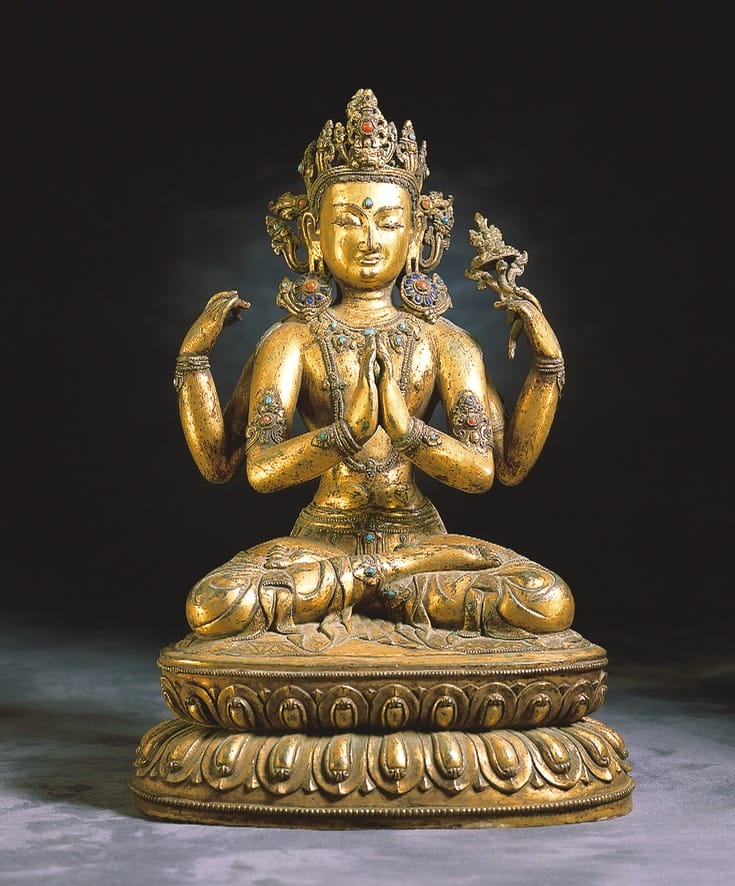
The
bodhisattva Avalokiteshvara embodies universal compassion and the
intention to save all sentient beings from suffering. Photo courtesy of
the Norton Simon Art Foundation, from the estate of Jennifer Jones
Simon.
I’ll never forget my astonishment when I heard the Tibetan teacher Nyshul Khen Rinpoche say, “Everything hangs on intention.” I thought, “Of course! Nothing happens without intention. It’s so crucial!”
Wise intention is one of the steps of the Buddha’s eightfold path, and it might be the most important one.
Wise intention is what keeps our lives heading in the right
direction. If I want to drive north to Seattle from my home in the Bay
Area, I need to keep checking that the sun is setting on my left to be
sure I’m heading in the right direction. The practice of wise intention
is like checking the sun: it’s a way to make sure our actions and our
lives are going in the direction we want.
Wise intention is the cornerstone of wise effort, of actions that are
wholesome and positive. The instructions for wise effort call for us to
continually evaluate our actions and choose those that lead to less
suffering and eschew those that lead to more suffering. This is easily
determined by checking if the action is being fueled by wholesome or
unwholesome intentions. So clarity about our intentions needs to be
present to inform wise effort.
Here’s an example of the importance of wise intention.
The date was September 12, 2001, the day after the destruction of the
World Trade Center in New York City. It was a Wednesday, the day of my
regularly scheduled class at Spirit Rock Insight Meditation Center.
Many more people than usual filled the room. People told stories of
connections they had to people who had been in the buildings, or to
family and friends who lived in New York. Others spoke about where they
were when they heard the news and how they’d felt at that moment. The
atmosphere was calm and sober, and I remember thinking that having
permission to talk about upset in a community of shared values is a
grace.
At the end of the class, I suggested that we recite these Buddhist precepts, which express our intentions as practitioners:
I undertake the precept to abstain from harming living beings.
I undertake the precept to abstain from taking that which is not freely given.
I undertake the precept to speak without being abusive or exploitive.
I undertake the precept to abstain from sexuality that is exploitive or abusive.
I undertake the precept to refrain from intoxicating my mind into heedless behavior.
The experience of affirming together our dedication to wise
and kind behavior was like a soothing balm to our frightened minds. I
felt consoled, and I believe that others did as well. It seemed to
restore some faith and confidence in the future to be surrounded by
people who trust the Buddha’s teaching that “Hatred is never ended by
hatred. By non-hatred is hatred ended. This is the eternal law.”
I think of this experience as supporting the profound centrality of wise intention. Here is one more example.
My friends Dwayne and Sara expressed their wedding vows this way, in
their own version of the Buddhist precepts. They said to each other:
Because I love you, I promise never to harm you.
Because I love you, I promise to never take anything you don’t want to give me.
Because I love you, I’ll speak only truthfully and kindly to you.
Because I love you, I’ll treat your body with love.
Because I love you, I will keep my mind free from confusion so that I act only out of wisdom.
Dwayne and Sara are now into the second decade of their marriage, and
they continue to say these vows to each other every morning.
Reaffirming their intentions for how they will be together sets up a
signal in their minds so they can catch a thoughtless word or action in
advance of it manifesting.
They are very happy.
Although I have argued for the primacy of wise intention, every
aspect of the eightfold path is equally crucial. That’s because each
part of the path is integral to all the others.
Traditional lists of the eightfold path are numbered from one through
eight, and therefore seem to have a beginning and an end.
Wise
understanding and wise intention often top the list and are described as
the impetus for beginning a dedicated practice. These lists then
continue with the three aspects of ethical training—wise action, speech,
and livelihood—and end with the mental discipline cultivated through
wise effort, mindfulness, and concentration. Other lists begin with
ethics, continue with mind training, and end with the wisdom components
that manifest as kindness and compassion.
Although the traditional lists describe these trainings as steps on a
path, they seem to me to be more like points on a circle, since every
one of the eight aspects is intimately reflected in and supported by
every other aspect.
In a sermon the Buddha preached for his son, Rahula, he called for
considering before, during, and after every action whether it was
potentially abusive or exploitive or genuinely rooted in kind intent.
This requires sufficient clarity of mind, through wise mindfulness and
concentration, to discern negative intent, and sufficient wise effort to
exercise self-restraint. Wise understanding deeply intuits the legacy
of losses that we share with other livings beings, and wise intention
expresses our ever-growing resolve to respond to all life with
compassion.
In this way, all eight aspects of the path work together to help us
lead a wholesome and awakened life, with wise intention the guide that
points us in the right direction and brings us back on course when we
lose our way.





